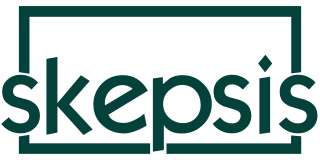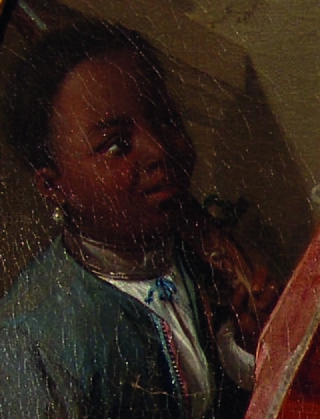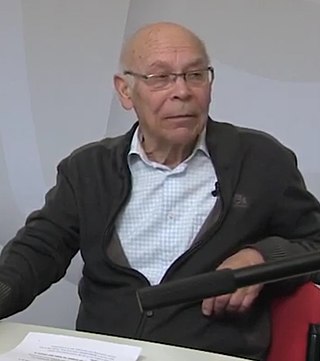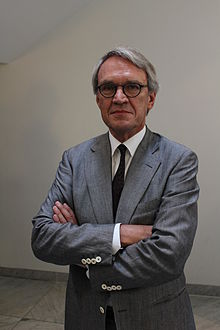
Hoorn is a city and municipality in the northwest of the Netherlands, in the province of North Holland. It is the largest town and the traditional capital of the region of West Friesland. Hoorn is located on the Markermeer, 20 kilometers (12 mi) east of Alkmaar and 35 kilometers (22 mi) north of Amsterdam. The municipality has just over 73,000 inhabitants and a land area of 20.38 km2 (7.87 sq mi), making it the third most densely populated municipality in North Holland after Haarlem and Amsterdam. Apart from the city of Hoorn, the municipality includes the villages of Blokker and Zwaag, as well as parts of the hamlets De Bangert, De Hulk and Munnickaij.
Greet Hofmans was a Dutch faith healer and "hand layer". For nine years she was a friend and advisor of Queen Juliana, often residing at Palace Soestdijk. She became the former Dutch queen's confidante in the 1950s, but was removed from the royal court after an affair that in the Netherlands is often referred to by her name, the Greet Hofmans affair.

Else "Els" Borst-Eilers was a Dutch politician of the Democrats 66 (D66) party and physician. She was granted the honorary title of Minister of State on 21 December 2012.

Maurice Arthur Mendes de Leon was a Dutch physician, considered one of the founding fathers of gynaecology in the Netherlands, partly because of his surgical skills, but also due to his study into the interaction between gynaecological and psychological problems.

Stichting Skepsis is a Dutch organisation dedicated to the promotion and practice of scientific skepticism. It is a member of the European Council of Skeptical Organisations (ECSO).

The Vereniging tegen de Kwakzalverij or VtdK is a Dutch organisation that investigates the claims of alternative medicine and opposes quackery.

Jan Albertsz. Rotius was a Dutch painter known for his individual and group portraits, breakfast still lifes, kitchen still lifes and fruit still lifes. He was active in Hoorn and was the father of the flower painter Jacob Rotius.

The Nederlands Tijdschrift voor Geneeskunde is the main medical journal in the Netherlands, appearing weekly. Established in 1857, it is one of the world's oldest journals. Its publication language is exclusively Dutch. The journal is published and supported by the Vereniging NTvG, which is currently composed of 209 medical scientists. The current editor-in-chief is Yolanda van der Graaf. The Journal's headquarter is situated in Amsterdam, the Netherlands. From early on, the objective was to create an overarching and all-encompassing journal for medical professionals to exchange insights, knowledge and opinion, and to guarantee consistent progress throughout the country. At present, the main sections include: News, Opinion, Research, Clinical Practice, Perspective. Nowadays, the NTvG focuses on reviews and commentaries of research articles which are often published in English. Further, it continues to produce research of medical practice mainly in the Netherlands.

Willem (Wim) Betz was a Flemish physician and professor emeritus at the Belgian university Vrije Universiteit Brussel (VUB), where he was head of the center for training in general medical practice until November 2007. Betz was a leading skeptic in Flanders and participant in the EU COST B4 Project. He was a founding member, president and vice-president of the Belgian skeptic organisation SKEPP.

SKEPP is an independent Belgian skeptical organization. The organization’s name is a backronym for Studiekring voor de Kritische Evaluatie van Pseudowetenschap en het Paranormale.
Skepter is a popular science magazine of the Dutch skeptical foundation Stichting Skepsis. It describes paranormal or controversial theories and methods from a skeptical perspective.

Jan Willem Nienhuys is a Dutch mathematician, book translator and skeptic. He taught mathematics at the Eindhoven University of Technology. He is also a board member and secretary of Stichting Skepsis and an editor of its magazine Skepter.

Catharina Jantina (Catherine) de Jong is a Dutch anesthesiologist, drug rehab physician, intensivist, since 2009 board member of the Vereniging tegen de Kwakzalverij (VtdK), between 2011–2015 as chair, and board member of the European Council of Skeptical Organisations (ECSO).
Cornelis Douwe de Langen was a Dutch physician. He spent a substantial part of his career in Java, Indonesia where he did extensive work on tropical medicine and observed an association between dietary cholesterol intake and incidence of gallstones, arteriosclerosis and other "Western diseases".
Piet Borst CBE is emeritus professor of Clinical Biochemistry and Molecular Biology at the University of Amsterdam (UVA), and until 1999 Director of Research and Chairman of the Board of Directors of the Netherlands Cancer Institute and the Antoni van Leeuwenhoekziekenhuis (NKI-AVL). He continued to work at the NKI-AVL as a staff member and group leader until 2016.

Pepijn van Erp is a Dutch mathematician and skeptical activist.

Adriaan de Bruin, earlier called Tabo Jansz, was an enslaved servant (kammermohr) of Dutch politician Adriaan van Bredehoff. Born in Africa and enslaved, he got to the Dutch Republic by way of either the Dutch Caribbean or in Dutch Surinam, and ended up a free man in Hoorn, North Holland. De Bruin and van Bredehoff stood for a portrait (1727) by Nicolaas Verkolje, now in the Westfries Museum in Hoorn.
Hendrik Klaas Aldert"Henk"Visser is a Dutch pediatrician. He was professor of pediatrics at the Erasmus University Rotterdam and the Erasmus MC between 1967 and 1995.

Alex Jan"Lex"van der Eb is a Dutch molecular biologist and virologist. He was a professor of fundamental tumor virology and later molecular carcinogenesis at Leiden University from 1979 to 2000. He has performed research in adenoviruses and was fundamental in the creation of the technique of calcium phosphate transfection and the founding of the HEK 293 and PER.C6 cell lines.
Hendrik Coenraad"Coen"Hemker is a Dutch biochemist and academic administrator. He was one of the founders of Maastricht University and was its its rector magnificus from 1982 to 1984. He was a professor of biochemistry from 1975 until 1999. In his research he has mainly studied thrombosis and hemostasis.














